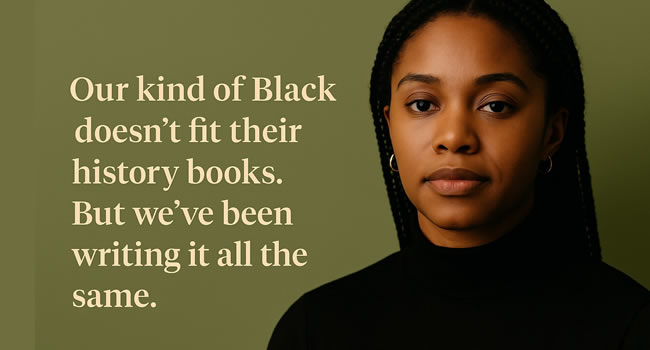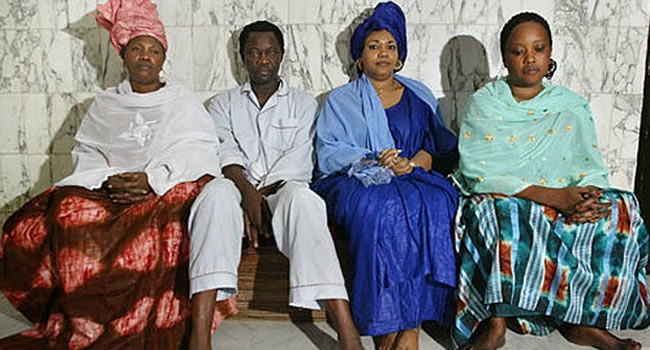But we’ve been writing it all the same in pepper soup, praise names, and permanent resilience.
October in the UK is Black History Month.
Yes October, not February.
That’s when the country pauses at least on paper to honour the legacy, pain, brilliance, and presence of Black people in Britain.
There are speeches, school assemblies, banners with famous quotes.
Maya Angelou gets her annual rotation.
Malcolm X is remembered again.
There’s the occasional nod to Caribbean Windrush.
And sometimes, if they’re feeling bold, they’ll mention racism in the NHS or the police.

But here’s the thing.
For many of us especially Nigerians, whether abroad or at home our kind of Black doesn’t always show up in those curated histories.
We don’t see our aunties who held three cleaning jobs to pay for someone else’s child’s school fees.
We don’t hear about the uncles who turned one room in Peckham into a lifeline for a whole village back in Osun.
We don’t see the boys who came here on scholarships and became community anchors, not just LinkedIn stars.
We grew up with legacy that didn’t make the flyers.
So while the UK marks this month in their own way, we’re holding space for our own kind of Black history.
The kind that didn’t start with slavery, didn’t get printed in textbooks, and doesn’t end in hashtags.
The kind that lives in language, in food, in names that never changed no matter what country we landed in.
That’s what this is about.
A remembering.
A reclaiming.
A reminder that even if the world forgets us, we haven’t forgotten ourselves.
You open your inbox, and HR has sent you a flyer with Malcolm X and Maya Angelou’s faces beside a bland sandwich menu.
You scroll through the hashtags quotes, Kente cloth, photoshoots in black and white.
And you pause.
Because something about it feels important.
But something about it feels… incomplete.
Not because the people they highlight didn’t matter.
But because our own people, the ones we saw up close the ones who made us Black in the way we understand it are never mentioned.
Where is the woman who held down two cleaning jobs and still sent money to Nigeria every month?
Where is the uncle who became a nurse, not because it was his dream, but because it was a ticket out?
Where is the cousin who navigated immigration, Tesco shifts, and a side hustle braiding hair in student halls?
That’s history.
Our kind.
The kind that doesn’t make it into PowerPoint presentations but carried generations.
They Want Our Struggle, But Not Our Story
Mainstream Black History Month loves to talk about revolution, resistance, reform.
And yes, those are vital chapters.
But what about the ones we wrote quietly?
What about the girl who changed her accent in school so she wouldn’t get mocked for sounding “too African”?
Or the boy who stopped bringing jollof to lunch because his classmates called it “weird rice”?
Or the aunty who brought three siblings over on her student visa and somehow, nobody ever got deported?
Those stories don’t look good on corporate posters.
But those stories are survival.
They are adaptation.
They are brilliance cloaked in everydayness.
We’ve Been History Just Not Theirs
In Nigeria, we weren’t “Black.” We were Igbo, Yoruba, Efik, Fulani, Gwari.
We were bright colours, loud laughter, and the certainty that your neighbour’s soup would somehow end up in your bowl.
Then we landed in the UK, in Canada, in the US
And suddenly, we were Black.
But not just Black.
The “other” kind of Black.
Too Nigerian for this crowd.
Too foreign for that one.
And so we began to disappear into translations.
But every time we gathered at weddings, baby showers, naming ceremonies, church anniversaries we remembered:
We are not footnotes in someone else’s story.
We are writing a whole book of our own.
The Real Curriculum
They won’t teach our kind of Black in school.
But we teach it in other ways.
- In the smell of fried plantain on a Saturday morning
- In the little girl who learns to greet with “Good afternoon ma” even though she’s in Leeds
- In the uncle who explains the Civil War during a birthday toast
- In the mother who reminds her children that English is just one language
We are the teachers.
We are the archives.
And we’re still writing.
So no our kind of Black doesn’t fit their history books.
It’s too spicy. Too spiritual. Too specific. Too loud. Too soft. Too deep.
But that’s fine.
Because when the hashtags fade,
And the posters are packed away,
And the stage lights dim on another curated month of excellence and pain—
We’ll still be here.
Still raising children whose names carry stories.
Still whispering histories into pots of egusi.
Still remembering the uncles who held passports and prayer books side by side.
Still translating our elders’ sacrifices into futures they never saw.
We’ve seen what they choose to honour.
Now, here’s what we remember.
What we carry.
What we’ll pass down.
And that, my friend,
is our kind of history.
📣 What’s your kind of Black history? Is it your mother’s akara recipe? Your grandfather’s war stories? Your own accent?
Let’s honour it, loudly and proudly, in the comments or using #OurKindOfBlack





